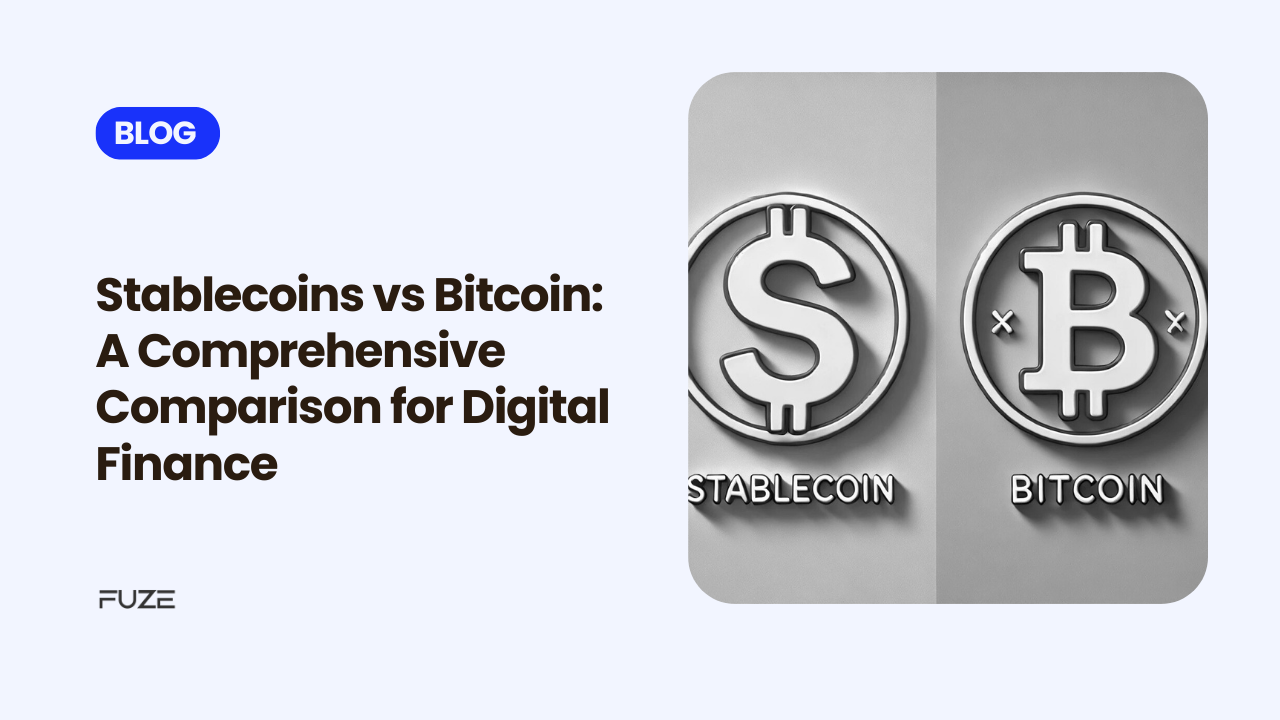In the evolving digital finance market, the debate around stablecoin vs. Bitcoin often underscores the distinct advantages and use cases of these assets. While both are digital currencies, they serve different purposes and cater to different needs in the global payments ecosystem. In this blog, we will explore the differences between stablecoins and Bitcoin, their respective use cases, and which digital asset may be right for your business.
What Are Stablecoins and How Do They Differ from Bitcoin?
Stablecoins are a type of cryptocurrency designed to maintain a stable value by being pegged to a reserve of assets, typically fiat currencies like the US dollar. This pegging allows stablecoins to minimise the price volatility that is characteristic of many cryptocurrencies, including Bitcoin. For instance, one USDC is typically equal to one US dollar, making it a reliable medium for transactions.
In contrast, Bitcoin is often regarded as a digital asset for investment. It operates on a decentralised blockchain and is not pegged to any asset. Its value is determined by market supply and demand, resulting in significant price fluctuations. This volatility can make Bitcoin less suitable for everyday transactions, as its value can change drastically within a short period of time.
Use Cases: When to Use Stablecoins vs Bitcoin in Global Transactions
Stablecoins for Everyday Business Transactions
Stablecoins are particularly well-suited for everyday business transactions. Their stability allows businesses to accept payments without worrying about sudden value changes. For example, when dealing with customers in different countries, using stablecoins can simplify cross-border transactions by reducing conversion fees and ensuring that the amount received retains its value. This reliability makes stablecoins an attractive option for businesses looking to streamline their payment processes and enhance customer satisfaction.
Bitcoin as a Store of Value and Investment Asset
Bitcoin is widely recognized as a store of value, similar to precious metals. Many investors view it as a hedge against inflation and a long-term investment asset. Its decentralised nature and limited supply (capped at 21 million coins) contribute to its appeal as a deflationary asset. Businesses might consider accepting Bitcoin as a form of payment for larger transactions or as a way to attract cryptocurrency enthusiasts and investors.
Which Digital Asset is Right for Your Business?
When deciding between stablecoins and Bitcoin for global transactions, consider the nature of your business and your target audience. If your primary goal is to facilitate seamless transactions with minimal volatility, stablecoins are likely the better choice. They provide the benefits of blockchain technology—speed, transparency, and lower fees—while maintaining a stable value.
On the other hand, if you’re looking to position your business as a forward-thinking player in the digital economy and attract crypto investors, accepting Bitcoin could be advantageous. However, it’s essential to understand the risks associated with its volatility and ensure you have measures in place to manage potential fluctuations in value.
Conclusion
In the question of stablecoins vs Bitcoin, the right choice ultimately depends on your business goals and customer needs. Stablecoins offer stability and efficiency for everyday transactions, while Bitcoin serves as a compelling investment and store of value. Understanding these differences can help businesses make informed decisions in an increasingly digital financial landscape.
About Fuze and How We Can Help
At Fuze, we specialise in providing innovative payment solutions that simplify the integration of digital assets into your business model. Whether you’re looking to accept stablecoins, Bitcoin, or both, our platform offers the tools and support you need to navigate digital finance. Contact us today, to enhance your payment processes, reduce transaction costs, and tap into the growing market of seamless digital asset acceptance.
Disclaimer: Virtual assets carry significant risks, including high volatility and potential loss of your entire investment. They are not backed by governmental protections, and recourse may be limited in case of loss. Always assess your risk tolerance, fully understand the risks, and seek independent financial advice if needed before investing.
Frequently Asked Questions
1. How does the value of stablecoins remain stable compared to Bitcoin?
Stablecoins maintain their value by being backed by reserves of fiat currency or other assets, ensuring that they can be redeemed at a fixed rate. Bitcoin’s value, however, is determined by market supply and demand, leading to significant price fluctuations.
2. Are stablecoins safer than Bitcoin?
While stablecoins are designed to provide stability, their safety depends on the underlying assets and the issuer’s credibility. Bitcoin, being decentralized, is less susceptible to control by any single entity, but its volatility poses risks. Both have unique advantages and risks, so the choice depends on your specific needs and risk tolerance.
3. Can I use stablecoins and Bitcoin together in my business?
Yes, many businesses choose to accept both stablecoins and Bitcoin to cater to a wider range of customers. Accepting stablecoins can facilitate everyday transactions with minimal volatility, while accepting Bitcoin can attract investors and cryptocurrency enthusiasts. It’s important to implement a payment system that can handle both types of digital assets effectively.
4. What are the transaction fees like for stablecoins versus Bitcoin?
Transaction fees for stablecoins are generally lower and more predictable than those for Bitcoin, especially during periods of high network congestion. Bitcoin transaction fees can fluctuate significantly based on demand, making stablecoins a more cost-effective option for frequent transactions.
5. How do regulations affect stablecoins compared to Bitcoin?
Stablecoins are often subject to more stringent regulations due to their ties to fiat currencies and the need for transparency in their backing assets. Bitcoin, while also facing regulatory scrutiny, is treated more as a commodity in many jurisdictions. This difference can impact how businesses choose to adopt and utilize each asset.







